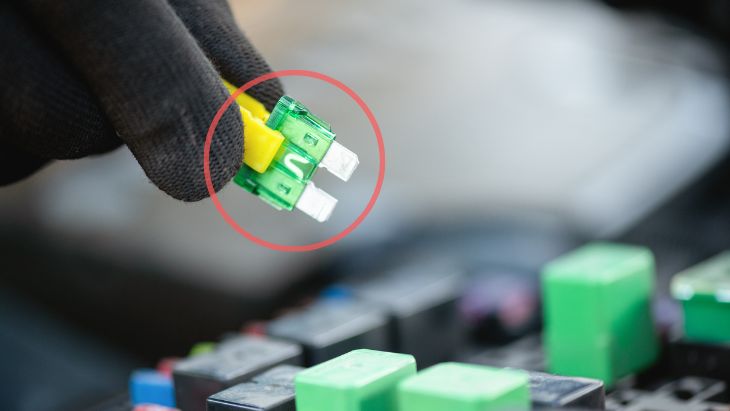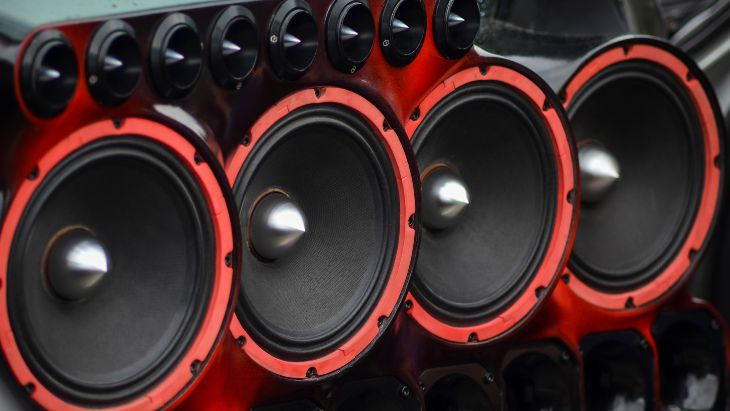It is often challenging to fix a car stereo or radio that decides to act up. There are different components of a car audio system that can result in low volume output. If you notice that your car speakers are quiet on full volume, you will need to fix the problem soonest possible to continue having a great listening experience. In this article, we will help you fix car speakers that are quiet despite turning the volume up.

Check the Fuses
The fuses that control the power supply to your car stereo can cause low volume from the speakers when faulty. You will need to check whether they are brown. In this case, check the location of your car’s fuse panel. If you are not sure where it is located, check your owner’s manual for instructions. Once you locate the fuse panel, open it to access the fuses inside.
Only remove the fuses that control power to your car stereo for inspection. Check whether there are any cracks on the silver filament inside or signs of burnt glass tubing near the silver contacts. If you notice either of these issues, replace the fuse with a new one. Then check whether the problem is resolved. Proceed to other troubleshooting options if you do not notice any issue with the fuses.
Check the Amp Cabling
Another reason why your car speakers are quiet on full volume may be a result of loose cabling on a car amplifier. In this case, you will need to remove the amplifier from its mounting location to access the wiring behind it. You may need a hex wrench or a screwdriver to remove it from the mounting location.
Once done, check whether the speaker cables are plugged in place firmly. If any cables feel loose, unplug them and plug them back in place. Test whether the problem of low volume output is now fixed. If not, check other issues that may be causing the problem.
Underpowering the Car Speakers
If you have just installed new aftermarket speakers and hooked them directly to your factory radio, you are likely underpowering them. Thus, they are sounding quiet despite being on full volume. If this is the case, consider adding an external amplifier to feed the speakers with enough power for more volume. Underpowering your speakers can also damage them.
When choosing an amplifier to power your car speakers and subwoofer, ensure it has enough channels to hook all the speakers. In most cases, a 4 channel amp is sufficient. Also, ensure it is powerful enough to feed the speakers with enough power. Most importantly, ensure its RMS power rating matches with the total RMS power rating of the speakers. Underpowering or overpowering your car speakers can damage them.
Upon deciding on the amplifier to install to fix the issue of quiet speakers on full volume, you will need a wiring kit to get the job done. Ensure the wiring kit is appropriate for your amplifier. For instance, most 4-channel amplifiers work well with 8 AWG cable for ground and power.
Here is how to install a car amplifier to fix the problem of quiet car speakers on full volume:
Step 1- First, connect the power cable from the amp to the car battery. To do this, wire the red wire to the positive (+) battery terminal. Hook the other end of the red wire to the amp.
Step 2- Next, connect the amp to the ground. To do this, hook the black wire to the grounding point. It should be a bolt fitted on a metallic part of the chasing. If the grounding point is painted, sand it down to ensure there is a good grounding connection. Hook the other end of the black wire to the grounding terminal on your amp.
Step 3- Next, run RCA cables from your receiver to the amp, and from the amp to the car speakers. When running speaker cables, run them along the opposite side of the car to avoid noise interference from the power cable. Avoid running them along the same side to avoid humming or buzzing sounds. The RCA cables are usually connected to the RCA inputs and outputs.
To connect the amp to the receiver, connect one end of the RCA cable to the RCA outputs on the receiver. Connect the other end of the RCA cable to the RCA inputs on the amplifier. Red (positive terminal) should connect to red and black (negative terminal) should connect to black.
Then run speaker wire from the amp outputs to the speakers depending on the number of channels you are connecting. Ensure you get the terminals right. For instance, the +ve terminal on the speaker should connect to the +ve terminal on the amplifier. The same case applies to the –ve terminals. You can use 16 AWG speaker wires for the best results. You may also tap into the existing factory speaker wiring as long as it is the right gauge and of good quality.
Also, hook the blue remote wire from the receiver to the amp remote turn on terminal. The remote turn on feature on the amp controls its power by turning it on when you switch on the engine and turning it off when you switch off the engine. That way, the amp does not drain the car battery when the engine is not running.
Overall, adding a car amplifier will help in making your car speakers sound louder, even when using a low-powered factory radio. Also, adding an amplifier will allow the speakers to produce cleaner sound due to reduced distortion.
Final Thoughts
If your car speakers are quiet on full volume, then you are missing out on having the best music listening experience in your car. You should troubleshoot the possible causes of this problem and fix it. Probably, it is an issue with the fuses and cabling or the speakers are underpowered. If you find out that the speakers are too powerful for your car radio, install an external car amp to boost the sound output for more volume. Hopefully, we have helped you fix this problem permanently.
Michael Evanchuk is a San Francisco-based sound engineer with 20 years’ experience installing, troubleshooting, and repairing commercial, automotive, and household sound equipment. Evanchuk owns an auto stereo center, where he offers highly competitive car audio installation and repair services. He has written dozens of articles on different sound engineering topics, all of which have been published in leading journals, blogs, and websites.





